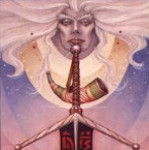|
I hate how the npc writers in Enemy Action just throw in "physically cannot use the right tense" - can you imagine trying to speak like that while lofi fucked around with this message at 02:52 on Oct 2, 2019 |
|
|
|
|

|
| # ? Apr 23, 2024 22:23 |
|
lofi posted:I hate how the npc writers in Enemy Action just throw in "physically cannot use the right tense" - can you imagine trying to speak like that while Yeah, NPCs with verbal tics like that are too obnoxious to live.
|
|
|
|
Ratoslov posted:Yeah, NPCs with verbal tics like that
|
|
|
|
They seem unable to go five pages without putting cannibalism in, too.
|
|
|
|
Mors Rattus posted:
A thing to add to this is that Hana, Du, Se is literally 1 2 3 in Korean. Hana is the only one of the names that "fits" how Korean names go. So it's not even just the circuitry that's being a blatant provocation.
|
|
|
|
Besides the problems already noted in the skill system, XXVc suffers from what Call of Cthulhu players would recognize as the "doctor problem." If you want to be an effective Medic or Engineer, you'll find yourself having to spread your points out across a lot of skills, while your Soldier or Scout buddy can pick a couple skills to be good at, dump all her points in them, and work just fine.
|
|
|
|
I learned Noblis at undergrad. My class was broken into five tables and graded on the composition of our collective story. 
|
|
|
|
Selachian posted:Besides the problems already noted in the skill system, XXVc suffers from what Call of Cthulhu players would recognize as the "doctor problem." If you want to be an effective Medic or Engineer, you'll find yourself having to spread your points out across a lot of skills, while your Soldier or Scout buddy can pick a couple skills to be good at, dump all her points in them, and work just fine. Maxwell forgot one small detail: The Medic career skills (Diagnose, Life Suspension Tech, Treat Critical Wounds, Treat Disease, Treat Light Wounds, Treat Poisoning, Treat Serious Wounds, and Treat Stunning/Paralysis) can't be taken as general skills by the other careers. This is bad because if you multiclass out of Medic, you can't increase those eight skills anymore, so I hope you got what you wanted out of the class before you decided "scalpel, monosword, they're both really sharp blades, but monoswords are much better at killing terrines." On the plus side? A Warrior who can Treat Critical Wounds is a very interesting (and dangerous) character. (There is a way around this, of course, but that's covered in another book.)
|
|
|
|
lofi posted:I hate how the npc writers in Enemy Action just throw in "physically cannot use the right tense" - can you imagine trying to speak like that while Eh, honestly I don't think it would be that hard to speak like that (I mean, yeah, chances are you'd slip up occasionally, but your players probably wouldn't notice or care), and I think it's actually sort of an interesting and unusual quirk to give a character. Or would be, if they'd given it to only one character. But the fact they gave such very similar glitches to two characters so close together in the book is kind of off-putting, yeah.
|
|
|
|
Snorb posted:Maxwell forgot one small detail: The Medic career skills (Diagnose, Life Suspension Tech, Treat Critical Wounds, Treat Disease, Treat Light Wounds, Treat Poisoning, Treat Serious Wounds, and Treat Stunning/Paralysis) can't be taken as general skills by the other careers. Didn't I say that? Well I didn't in this section, but yeah.
|
|
|
|
I think many of the quotes in Nobilis 2e aren’t literary but just made up by the author.
|
|
|
|
Wednesday seems really nice, I like the fact that there are some honest to goodness "I'm doing my best Dammit" Demons about.
|
|
|
|
Pretty much all of the quotes in the Nobilis books aren't actually real, yes. They're made up.
|
|
|
|
Spoiler: Glitch goes back to using "GM" because pound-for-pound, people who are annoyed at cutesy names for the moderator seem to significantly outweigh the people who chuckle.
|
|
|
|
Josef bugman posted:Wednesday seems really nice, I like the fact that there are some honest to goodness "I'm doing my best Dammit" Demons about. Wednesday ought to talk to the Free Council, they'd get along like a Bastille on fire.
|
|
|
|
Joe Slowboat posted:Wednesday ought to talk to the Free Council, they'd get along like a Bastille on fire. "I want to kill God" "HOLY poo poo ME TOO!"
|
|
|
|
Night Horrors: Enemy Action Part 6: WATCH TV, HUMAN  Legs cost too much. The God-Machine considers television to be one of the best tools available to it for mass influence. With so many TV viewing options available, it is able to produce stories designed to keep humans pacified and docile or inspire them to key actions - such as making their own TV programming for it. TV shows convey ideas to millions at once, faster than any other medium before it, and with the rise of the internet, it just has another vector. However, there are so many options of what to watch, and choice paralysis makes it hard for humans to decide. That's why Jennifer Jasper exists. As far as any human is aware, she started reviewing TV shows online a few years ago. Her witty, insightful commentary and relatable personal stories earned her first hundreds of viewers, then thousands, then millions. She tells her viewers what's good, what's bad and what shows really need reworking to survive. Demons and stigmatics look at her and, sometimes, they can tell - she's an angel directing television traffic for the Machine. Her mission is very simple: she is to manipulate TV programming that the God-Machine uses to communicate ideas to humanity. However, this requires her to be highly visible, and she's had to scramble to fortify her human Cover, coming as close to human as she can while, hopefully, avoiding a Fall. Her show, Just Sayin', is currently translated into Spanish, French, Mandarin, Japanese and German. Additional languages would currently arouse suspicion. She maintains an American accent when dealing with British or Australian TV, but uses appropriate regional slang. Her review selections are chosen first by guidance from the Machine and second, for when that guidance is not forthcoming, whatever she happens to find interesting. In her early days, Jennifer wasn't sure how to pick shows, so she relied on other reviewers or angelic comrades for suggestions. As she has developed free will and taste of her own, she has made her own selections, finding hidden gems in TV broadcasting. In some cases, the shows she selected became vehicles of the Machine's operations after the fact, as other angels used her reviews as guides for proactive work or for their own missions. A handful of Saboteurs are aware of Jennifer's nature and use trolling comments, doxxing and similar tactics to try and take her down; unfortunately for them, these tactics have been less effective recently due to many taking strong stances against online harassment. (MORS NOTE: This was published in 2018. Really.) More importantly, some hunter angels have taken to using these trolling comments as the starting point for tracking the less cautious demons making them. Doxxing is, unsurprisingly, not very effective because pinpointing Jennifer is impossible with her current setup. She uses several layers of IP spoofing, never uses natural lighting and relies on stock background sound effects to fake background noise. Her IP has, at various times, pointed to a donut shop, the home of an elderly woman or a sex toy shop in a bad neighborhood. Jennifer appears to be a young white woman in her 20s with perfect hair and makeup. When she visited a makeup reviewer as a guest, she actually had to add pore texturing to her skin, and even then it was amazingly perfect. Jennifer's critics call her fake or plastic, and some of her body actually is made from a sort of idealized form of plastic for lightweight flexibility. She ignores this (and the book accidentally calles her Jssica). Her mastery of language lets her reach viewers across the globe, her appearance is adequately attractive to most of her audience, and her wit is appreciated. For a long time she existed only from the waist up, but as she grew more famous, the Machine modified her to a full human form so she could meet people in person. Her fans tend to be in awe of how fast she can form opinions of people and how unafraid she is of sharing them. Some call her a bitch, others a feminist; Jennifer considers herself neither. She uses cutting edge technology, and her home base has a wall of the latest HD monitors, streaming hundreds of shows at a time. She abandons old technology the moment something better arrives. She does have problems, however. Fragments of older machines stick to her plastic and polymer parts no matter how finely she grinds them down, and her lubrication systems have trouble washing them away. The friction burns have started to compromise her structural integrity. If asked about it, she claims it's an allergic reaction. Jennifer often makes recommendations on how suffering shows can do better. Some of them make sense, while others seem random, with no basis in fact or logic in the storyline of the show. The thing is, her recommendations work. She recently told a reality show to film an episode in a crowded mall. The show, based on wilderness survival, had no idea what her point was, but based on her past success in advice, they do so, framing it as a zombie apocalypse survival exercise with the zombies already in the mall. Ratings skyrocketed, and the show avoided cancellation. What the producers don't realize is that the mall got a much-needed increase in power to the Infrastructure within it - though if they did, they wouldn't care. It got them money. She never accepts bribes for positive reviews, either. Sometimes she gets paid after a positive review, or to avoid a lawsuit when a show's producers and writers incorporate her advice. She just doesn't take paid reviews, period. She claims it's out of integrity; in truth, she's just not confident her cover could withstand the scrutiny of a lawsuit that might result if her mission required her to break the contract involved. Even with her fame, she has only just started making any real effort to improve her cover story. Fortunately, her mission has not yet required her to sign a paid review contract. Jennifer is entirely unafraid to break secret information on the shows she reviews. No one knows where she gets the insider info, largely because it is provided to her by the God-Machine or its angels. She sometimes reveals real information, sometimes fake, as a means of embedding subliminal messaging in her reviews. In some cases, the false rumors take on a life of their own and become true after the fact, as producers or writers decide they were a good idea. Jennifer spaces out her 'reveals' randomly, to ensure viewers never know when they'll hear the latest dirt. This ensures her subscriber numbers never fall too much. She has more free will than most angels tend to - it's required for her mission. She doesn't rely on magic from the Machine to bring in viewers, so she has to keep her brand image fresh and relevant, which means a full social media presence, which means enough humanity to support one. As her cover gets deeper, the temptation to rebel only grows. Jennifer is heavily at risk of Falling, but knows how much her work relies on obeying the Machine's will. She'd never get her insane but working show advice without it. Jennifer wants to serve and be loyal still, but she isn't sure why she's serving, since the Machine never tells angels why, and the temptations of self-interest grow ever greater. Jennifer Jasper is a rank 3 angel, moderately powerful and with Influence (Opinion) 3. She's able to wield powerful magic to implant ideas in people's heads or make them hallucinate, can make herself hard to notice and can find things. She isn't going to be a challenge in a fight but almost certainly has fighting angels on call. Her Ban is that she must give an opinion about any person mentioned in her presence. Her Bane is fragments of outdated technology, such as broken TV screens or the ash of burned books or magazines.  A harmless old lady. Madam Wong/Ms. Wong is a protector, a guardian of living fire. She hides in the shape of an old Chinese woman running an herb shop in Tsim Sha Tsui, Kowloon, in Hong Kong. The particular intersection is an important place for the God-Machine (or, as the angel thinks of it, the Light). At the intersection is a small church built out of a renovated shop and house, attracting ever more worshippers tired of the fast-paced Hong Kong life. This church must be protected, because something is coming. The gears are turning. They cannot be allowed to stop. The herb shop has been in the neighborhood for ages. Few can remember a time when it was not there. The herbs are there all the time; they never run out. They treat anything, the old woman tells people. She has herbs for any ailment. Boil them, drink them twice a day. Some say she is a creepy lady and avoid her shop, not only for the smell and that it is always cold but because it feels weird and wrong. Cell signals cut out in the shop. It's always cold. Weeds and living plants wither there. The whole place is unsettling. Humans that can sense it feel a gut-wrenching sense of revulsion. Others are drawn to the shop. The rickety, mildewed old signboard outside could be 50 years old or a hundred. Don't touch it. Don't ask about it. The characters on it just name the shop. It's ugly, unlike the other signs in the area. Within it are the basic Infrastructural foundations that ensure the shop operates properly. The rest of the storefront can change, but the signboard never will. If it goes bad, the whole shop does. The old woman produces delicious double-boiled soups daily. She is programmed to do so. Only two people get to drink them - Anna, the key to her mission, and Cheong Wang, the old woman's working friend. The old woman understands that humans are fragile. They break easily, in mind and body. They are blind to the world. She hates to see Anna deal with her abusive husband and the pressure to have a son, hates to see Cheong Wang deal with his research and his sick mother. She is starting to care too much. At night, she checks herself for problems, flushes out intrusive memes and purges herself of attachments. It is painful. She screams. The angel appears to be an old Chinese woman with a hunchback, always wearing simple clothing. She looks ancient, age lines all over her face and liver spots on her arms. She walks with a stick; it is for show. Her responses are short and clipped, and doesn't make small talk except for with her two wards. Her customers respect her age and do not pry into her private life. Those unfamiliar with her think her rude or abrupt. She is very protective of the church, Anna and Cheong Wang. Anna visits the shop often, worried and frowning. She is a preschool teacher, already graying, and she has hand, foot and mouth disease. The preschool will be closing for two weeks to be thoroughly cleaned. Her husband is angry - he wants her to have a son, not the three daughters she's already birthed. He sees her as a failure. Cheong Wang is young but arthritic, walks with a limp and speaks with a lisp. His research at the university is stuck, and his funding halted. His mother is sick and in pain, and only Madam Wong's herbs can help. When demons threaten, the angelic Madam Wong is not afraid to fight. She reveals her true form, shedding the ancient body and becoming an armor-plated warrior with the head of lioness, wings of white fire and a tail like a whip. Her body is coated in eyes, which never blink. She shields her church and her wards with her body if need be. She may also assume the form of an alternate human cover - Ms. Wong, a much younger version of Madam Wong. She is small, has shoulder-length black hair and is a plain, simple girl. She hides easily in the masses of humanity, wearing Korean fashion and drinking iced lattes. This form is used when she has identified demonic activity and isolated it, going to investigate and find the threats. If danger threatens, she reverts to her combat form. The shop also has a small cat that works as a warning system against intruders. It has green eyes and distinct black, gray and red fur. It is neither male nor female, and its tail moves to an odd rhythm. Some whisper that entering the shop unannounced means you will vanish. Madam Wong will deny this if asked, of course. It's true, though. She uses her herbs to send intruders into a fugue state, and most do not recover for days. They have no memory of that period. Sometimes, it may last weeks or even months. At night, the shop makes strange noises, like nails on a chalkboard or metal drilling metal, or strange, inhuman wails. The shopfront often changes size or shape, with apparent renovations done overnight. Locals assume the old woman must know some really good construction types, or had a rich (and dead) husband to pay for it. The area is always spotlessly clean, and the shop sometimes seems to shift locations when no one is paying attention. But the area is a maze anyway, so it's hard to tell. The signboard and cat always remain. Madam/Ms. Wong is a rank 3 angel, powerful but limited. She has Influence (Cold) 1 and (Herbs) 2. Her powers let her drive people mad, avoid notice, hide as a human, heal herself and leave messages hidden in the environment. She's well-armored and strong, but a sustained assault could take her down. Her Ban is that if Anna or Cheong Wang needs her, she must help them, period. Her Bane is the signboard being removed. Next time: The Old Lady in the Holler, the Cleaner
|
|
|
|
The weird focus on doxxing Onyx Path has really weirds me out in a line Matt McFarland used to run. Just feels like he was less concerned with internet trolls ruining women's life and more people looking into his past.
|
|
|
|
|
SunAndSpring posted:The weird focus on doxxing Onyx Path has really weirds me out in a line Matt McFarland used to run. Just feels like he was less concerned with internet trolls ruining women's life and more people looking into his past. Onyx Path at the time was more than just Matt. Several of the Devs were being doxxed and harassed at the time. Still are.
|
|
|
|
Josef bugman posted:"I want to kill God" Or they could talk to the Silver Ladder. "I want to kill God" "What did I ever do to you?"
|
|
|
|
So far most of these angels have been a lot more sympathetic than I was expecting. Though I get that's probably at least partly intentional to provide for the possibility of nudging them toward a Fall and turning them into allies.
|
|
|
|
lofi posted:In a real-world setting, you can figure out a reasonable plan to stop The Evil Plot, but in Demon do players just do something like a "And then they [science]" from star trek? Roll dice to get told by the GM what might work?
|
|
|
|
Yes and no? The God-Machine is more material than the Exarchs so you can much more specifically say 'ok time to blow up Carlsbad Caverns' - you can find and detonate Infrastructure. You may not know what it's doing or why but you can always know there's a physical system to disrupt. But, on the other hand, the Exarchs in Mage are off in the Supernal underpinnings of reality, but their agendas are extremely knowable. They intend to maintain the status quo through their various symbolic natures, which are well enough known that you can pretty well understand what they want in the broad strokes. There may be twists or revelations, but they are directed and comprehensible tyrants. The GM is not. What exactly the Infrastructure is intended to accomplish, ornwhether there's even any intent, or how to safely disarm it... these are extremely obscure and unclear. The motivations and methodology are physical, but they're also inscrutable.
|
|
|
|
Halloween Jack posted:I've never understood this. The God Machine is a literal machine made of literal parts that you can literally blow to literal pieces. It's the opposite of some astral monolith on another plane of reality. Not... exactly. Like, yes, theoretically you could maybe possibly dig up and blow up every single piece of Infrastructure on Earth, likely destroying large chunks of history and space/time in the process, and likely dismantling the God Machine to some greater or lesser extent. But from how I read it, the Infrastructure is just what the God Machine acts through, not the Machine itself. So even if you blow all that up, likely it'll just poop out more Angels that try to build new poo poo. Secondly, they kind of stretch out the UNKNOWABLY ARCANE thing so it's like... there are no patterns. You, the player, cannot deduce that a given Infrastructure does a given thing because it has things that are specifically like a thing. There is no metaphysical set of rules or laws that give you any levers to play with. There can be an arbitrary amount of Infrastructure and it can do any number of arbitrary things, with any arbitrary materials and setups. Like... if there was any sort of internal logic, the players could try to be a step ahead of the God Machine in some fashion, but they can't. All they can do is roll the dice for how well they read the magic and then get told by the GM what they read. It's kind of like the problem with Eclipse Phase's TITANs where they work so hard to make them completely inscrutable that they may as well just be a divine RNG, completely blurring the line between "alien motivations" and "random motivations."
|
|
|
|
PurpleXVI posted:You, the player, cannot deduce that a given Infrastructure does a given thing because it has things that are specifically like a thing. There is no metaphysical set of rules or laws that give you any levers to play with.
|
|
|
|
The Infrastructure is the Machine, in the same sense that the components inside your PC case are your computer. There is not some nebulous mind - there’s Command and Control Infrastructure, which does the planning and commanding.
|
|
|
|
While it's up to an individual reader whether they like that sort of poo poo or not, the God-Machine absolutely is similar to the Exarchs in that there's no Canonical Grand Plan that spells the end of the game line, and that's not some ~spooky mystery~ or whatever. There's certainly a lot more science-fantasy whimsy mixed into Infrastructure, but whether it's more season 1 Twin Peaks or season 2 Twin Peaks depends on the table.
|
|
|
|
The God-Machine also has some fairly consistent high-level goals and motivations: it seeks to preserve the status quo of the nWoD (monsters hidden in the dark, humans keep their heads down, the world keeps spinning), and it wants to recapture Demons and integrate them back into itself. Also, while I can't recall it ever being explicitly stated, pretty much all the fiction relating to the God-Machine suggest that it's constantly growing and expanding (building new Infrastructure.) These are passive goals for the most part, but it's also important to keep in mind that Demons pretty much have to poke the bear to survive. Aether only comes from the God-Machine in the fiction, and in the mechanics you can either get it from Infrastructure or a small, limited burst by potentially exposing yourself. Demons have to live near it, subvert it to get their supernatural energy, and constantly be on guard against it. The God-Machine also responds pretty consistently to threats or setbacks. Its extremely focused on cost-efficiency: you can make it gently caress off from a particular area or project by making it too expensive for the Machine to operate there, and it will just shrug its metaphorical shoulders and do its thing somewhere else, as long as you don't deliberately provoke it. In short, it has a character even if a certain degree of mystery is necessary to its role in the game. That Old Tree posted:While it's up to an individual reader whether they like that sort of poo poo or not, the God-Machine absolutely is similar to the Exarchs in that there's no Canonical Grand Plan that spells the end of the game line, and that's not some ~spooky mystery~ or whatever. There's certainly a lot more science-fantasy whimsy mixed into Infrastructure, but whether it's more season 1 Twin Peaks or season 2 Twin Peaks depends on the table. Another thing to consider here is that both the Exarchs and the God-Machine have basically already won. They don't need to be massively pro-active; the players do.
|
|
|
|
 quote:We’ll respect the captain of our baseball team, but only so long as we’re respected. If we win, all the better. We expect to be able to argue with the head of the community centre or with the members of the P.T.A. We want those positions to be rotated, to give everyone a chance at nominal authority and thus weaken the grip that any member holds. When it comes time to replace one of these figures, we know the whole group will decide. That helps set the tone for what our leaders ought to do – and what we’ll do if they don’t. In our careers, we rarely have such opportunities. From our perspective, those higher up the chain seem to have little concern for us. They appear to be wealthy or lucky. As such, we are a bit jealous. It is easy to think that they have obtained power through selfish means. We tend to think of leadership as something obtained through backstabbing, greed, dirty tricks or pull. This is Smolensk's introduction to Chapter 9: Power Politics, in which he takes about two pages to say that the DM shouldn't be the sole authority of the game but should exist for the benefit of the players. Well, I'm out of steam. I'm just going to summarise the actual salient points made among the morass of awkward philosophy. ... Because oddly, there are actually some much better ones in this chapter. There are also some horrible ones mixed in, though. We start with that just avoiding the things that are known to create a "bad game" doesn't mean that a game is good (half a page). Fair enough. Next: players want to be fairly challenged, which is difficult because the exact guidelines for what they'll consider fair and challenging are very unclear; but players want to be able to trust the DM and the DM wants to be so trusted (one and a half pages). Ok, excellent point. One way to build this trust is to give the players hints or involve them in discussion of what's happening, without spoilers; it's not so much to seek their consent as to assure them that there is a grand plan at work which is a contribution to fairness (one page). Could maybe use a few more actual instructions, but perfectly reasonable. Having worked on a setting and a game for upwards of thirty years builds trust because the players are sure after that that it's not going to be just ignored or thrown away, and the DM isn't likely to quit the game. Oh come on, Alexis. That can't seriously be advice you're giving to new people. You were DMing for all those thirty years, weren't you? Ok, new section. Control. Half a page on how this isn't a section on how to deal with player problems because there's no sure way to change people's behaviour. Then two pages on how if co-operation between the players breaks down, it is because the co-operation is either not being rewarded, or is functioning improperly for some reason, such as because not every member is being respected. "Every player, regardless of ability or personal social skills, has the right to speak and be heard." Well, that could be a good message of inclusion, or it could be that the guy who suddenly showed up wearing a swastika still has the right to speak. And if there is an argument.. quote:Parties should discuss, even argue. rom stress, these arguments will at times get heated. There’s nothing wrong with passion, however, and when I hear it, I’m on hand to guide it, to keep it healthy. Anyone listening can tell, however, when passion becomes anger and when anger turns to frustration. If I have let it go that far, I am at fault. I have failed to maintain a safe environment. Yea, believe me, there's all kinds of reasons why people might want to fight you.. The Vendor Theory discusses the perception of the GM as the vendor and the players as customers, and some contract of expectation - "the social contract" perhaps - existing between them, which the customers use to measure satisfaction with the product. Smolensk argues that this is inappropriate; the GM's role shouldn't be to sell the game because the GM has plenty of other things too. The players aren't mere consumers because their characters are involved in the world, and they interact with each other as well as the GM. Plus, the idea of the players as consumers implies they are "paying" somehow, which is wrong, especially if the perception is that their "payment" consists of participating and engaging in the game. If anything, the players should be "selling" their adventures and plans to the GM, who "pays" by supporting them in play and the world. Huh. I genuinely like that. I mean, obviously there's nothing about how to make sure it is that way, obviously anyone who's read this far has given up on any hope there's going to be anything like that in the book, but it's an excellent point. Not one I can agree with, being one of those GMs with shelves of weird unused game systems who definitely feels they're supposed to sell, but I'm sure Smolensk would smack me and tell me to just run D&D. Making Change Happen unfortunately returns to vacuity by taking two and a half pages to explain that any major changes to the game have to go through the DM, but this doesn't mean the DM has total control; and that if a change goes wrong it can be rolled back or tried again. And we're then into Chapter 10: Bad Games. Oh, boy. After spending 1 and three quarter pages on how running a bad game doesn't make someone a bad person, we get to the first section.. Charisma!? Wait, why is that in a section on bad games? Oh, wait. It's actually yet another repetition of how you shouldn't make your game too easy in order to be liked. The title and some of the writing sort of vaguely suggests that the author thinks that if you're stuck not being charismatic then you're stuck having to capitulate to the players to be liked because you have no other merit, which I can sympathise with - and the author argues against this, although only in vague terms about "inner resolve". We round off with a full 1 page on how charismatic Alexis Smolensk is. Exploiting Vulnerability starts with a terribly long and vague discussion of how players might end up on the other end of the stick - surrendering power and interest to the GM and enduring things they don't like simply in order to make the GM like them and thus remain in the game, for several reasons: a) it's what they've always done and is established habit; b) they're too linked to their character; c) they have social ties to the group, or d) they are borderline about the whole hobby but either have unfulfilled hopes or nostalgic memories, and feel that quitting one campaign would put them on the path to quitting completely. Very similar to the Obligated player, perhaps. The section states that the GM shouldn't take advantage of this, and gives the example of a GM who convinced a player to play their rent with the threat that the shared play space would be lost if they had to move out. Well, ok, yes, that seems like a fairly bad thing. But we then crank the grog dial into overdrive with the statement that the GM asking players to "buy in" to a campaign is in the same category! Look, I just can't summarise this.. quote:Were I to pursue this tactic with my players – and were I particularly charismatic – I might even be able to assign them parts in my ‘play.’ I might give them pre-made characters, along with pre-determined characteristics, pre-established histories and so on; letting them know what to say and when, what to do, how they should feel when specific things happen, at what points in the campaign they should feel triumphant – and so on. I could encourage them to feel appreciated by praising them on their good behaviour as obedient players, giving them a reward and a kind word to encourage their further compliance as the campaign moved forward. And... that's all there is in the Bad Games section. And there's then a section on Worldbuilding. Hey, I already said I wouldn't cover this in GMing advice. Thank god I don't have to attempt to distil more of this writing. The final chapter, Gaining A Level, starts with a full six pages of rambling philosophical text on the nature of work! This is apparently all to justify the idea that time spent developing a world should be seen as "work" and not "play" because, enjoyable as it may be, it has a tangible result and ongoing reward; and that players should be able to work in the same terms. Finally, At The End And The Start begins with this gem: quote:I began from a place where the art of being a DM was a mystery. I could run a game, but I couldn’t explain how and I couldn’t give others advice. In researching and putting together these pages, I had to teach myself what was going on and figure out a way to make that comprehensible to the reader. The process was humbling. More than once, I found myself reading and turning red from embarrassment as I realized things I had been doing wrong all my life. I haven’t written a book about how to run a game for others. I’ve written it for myself. Aha. That explains why the entire book is written in first person and contains very little that's any use of anyone other than you. Yes, becoming aware of your own processes is a thing which can take practice and be uncomfortable when you first do it, but they didn't mention doing anything about learning to advise others. quote:In 40 years, no theoretical treatise of role-play, for use by expert role-players, has ever been written. In 40 years, Mr Smolensk has not read Usenet. quote:I believe that when the subject of in-depth, investigatory book on role-play has been proposed, one that would talk about people and not rules, the answer has been that there aren’t enough smart role-players in the world to make the book marketable. This, despite the fact that role-playing is practiced throughout the world by college and university students. People who read! And probably people who can't deal well with people too, but certainly people who don't want to follow your approach. quote:That is why I often find others who question if the game has any value or relevance beyond having fun. In reaching this point in the book, the reader should have repeatedly noticed how often the tools and skills to become a better role-player exactly reflect those needed to conquer the world. Oh, right! That's what this book actually is. A supervillain origin story! quote:This book has been written to create change. And finally, there's an index. quote:aesthetics, 241–51, 258 ... An index that's completely useless because .epub format dynamically reflows pages and thus these are meaningless unless your screen is somehow exactly the same size as Smolensk's. So. Yea. There were maybe a few bits I liked. But unless you're really keen on reading a mega-grognard writing an extended rant on how they are a mega-grognard and wish to continue being one, this is not worth it. This is actually worse than Venger Satanis's GMing book, for god's sake. It's only the second one in this series where I'm actually glad it's over.
|
|
|
|
Tuxedo Catfish posted:Another thing to consider here is that both the Exarchs and the God-Machine have basically already won. They don't need to be massively pro-active; the players do. Here's a good question, though, what can the players accomplish by "beating" the God Machine in an area if we assume they're not acting to counter a specific project and just decide to be "pro-active"? Like what is the nature of a section of the Earth without the God Machine's interference?
|
|
|
|
PurpleXVI posted:Here's a good question, though, what can the players accomplish by "beating" the God Machine in an area if we assume they're not acting to counter a specific project and just decide to be "pro-active"? Like what is the nature of a section of the Earth without the God Machine's interference? A hotbed of Demons getting too comfortable and messing with each other instead of it.  Also, it's likely that the God-Machine is to some extent responsible for averting various supernatural (or even natural) disasters, although it's also likely that some of them were caused by it in the first place, so an area where it's not operating is likely to get "interesting" in all kinds of ways.
|
|
|
|
That doesn't sound like much of an improvement. E: Though that's one of the general issues that can come up when you don't really want to write about protagonists, and also put in 'also the insane status quo oppression machine does prevent disasters'. I think one of the refreshing bits in Geist is that it starts with 'actually, you are probably working for decent purposes, though you could choose not to, and what you're trying to change should be changed'.
|
|
|
|
I think the "God-Machine/Exarchs sometimes also prevent disasters" is more intended as "and then things continue to be interesting" when you beat them, instead of "and then everyone in the restaurant stood up and clapped." The God-Machine is specifically noted to be an engine of oppression, so whatever you want the lessening of that to look like. I'll admit, it would be really nice if there were more discussion in any of the CoD games about what low- and mid-tier "win" states look like, and how to continue playing beyond them.
|
|
|
|
Yeah, the difference there is that the God-Machine is orderly and efficient about turning people into blood slurry and feeding them into the gears and does a better job of concealing it after the fact, not some cynical "actually, throwing it out made things worse" kind of deal.
|
|
|
|
The lack of interest in that is the bigger problem, yes. It's something I notice in a lot of games, not just CoD: There's not much consideration of what victory would look like or what people could be working towards.
|
|
|
|
Yeah, the Exarch-free world is kind of difficult to plan for, because it's a world where the Gods of Oppression are no longer on top. To what degree that looks like the end of Promethea or a magical space-Atlantis Communist utopia is going to vary wildly by table. That being said, Wednesday would absolutely get along with the Silver Ladder. "I want to make Humanity into the Gods of this world, because the human spirit is the highest good." "...yes, were you at the meeting?" I mean he's basically trying to build his own psychic Star Ladder with God-Machine infrastructure. (Which, given the implication in some Mage books that the God-Machine might have started as the star ladder or an equivalent device, well... that's fun.)
|
|
|
|
I'm not even sure it's useful, outside of one or two wacky "What if…" books like Shards of the Exalted Dream (but better), to tackle "what is ultimate victory like?" for CoD games. But the games could absolutely use more discussion on what the process and result of lower-level successes mean for the protagonists. Like, Catabasis in Geist has shades of that to it, but it's got more shades of "ultimate victory" than "a significant step towards ultimate victory" and it's still pretty brief.
|
|
|
|
The main thing is that I find a lot of game settings sort of calcify over time. What starts as an order from the top like 'don't majorly change the setting in an official published adventure' (WHFRP is my area of particular expertise, so naturally I come back to it) turns into an impression of 'You can't accomplish things'. Or you end up with stuff like Shadowrun where it becomes accepted wisdom and stuffed to the gills with 'Oh well if you try to do X, Aztechnology/Whatever Big Dragon/whatever kills you instantly and unstoppably' style thinking. Having some little hooks and stuff like 'hey, here's where some things can change' is really useful just in avoiding giving groups the impression of stasis. Which is the long way of agreeing that games need to consider more about minor and middle term victories, because those are the things groups build their own ideas of climax/ultimate victories out of, which is absolutely the sort of thing that should be left to individual groups (if they want to touch on them at all) and don't need as much support. I suppose what I'm trying to say is that the need to keep a setting consistent (or the desire to keep it open) can sometimes accidentally give people the impression there's nothing that can be achieved, even if that isn't the authors' intent.
|
|
|
|
God-Machine keeps the Mercers going, Musk popular and Zucherberg rich (and plausibly humanesque). That's why you want to gently caress it up. Why do these writeups keep mentioning firearm ability or, like, Wednesday's spear skill? When is that ever going to come up? Like, I got that using human weaponry against Woofs is pointless, but it doesn't seem like demons are less robust or in need of a 9mm boost to their terrible warforms.
|
|
|
|

|
| # ? Apr 23, 2024 22:23 |
|
If you can do it with regular person bullets, it makes it a lot easier to keep the giant sign that says 'How do you do, fellow human beings with skin and organs, I too enjoy having biological processes and soft skin' from falling off.
|
|
|




































